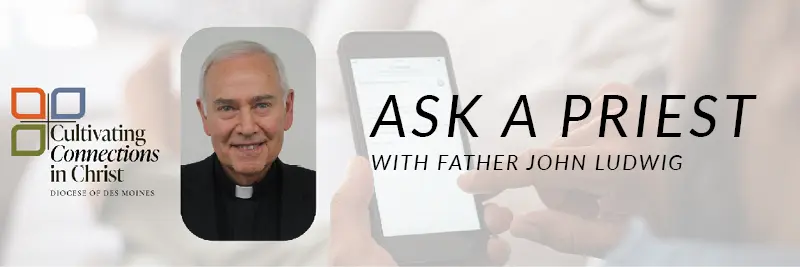What does the term 'monsignor' mean?
by Father John Ludwig | May 15, 2024

Q. Whatever happened to priests being named monsignors?
A. The term monsignor means literally “my lord.” In some countries it is common to address bishops as monsignor. In the United States and some other countries, we usually refer to a bishop as “bishop” or sometimes, “your excellency.” The title monsignor has also been given to certain priests whom the local bishop wishes to honor or give special recognition. Only the pope can designate a priest as monsignor, but it is almost always at the recommendation of the priest’s own bishop.
Several years ago, Pope Francis began restricting the nomination of priests to become monsignors. Only those who are over the age of 65 would be named. The pope said that he didn’t want to encourage clericalism or to reward some who might be considered “climbers.” Those who have already been given the title monsignor continue to retain that title.
Q. In the days of John the Baptist, what did it mean for the people to be baptized? Were these people Jews or outside the Jewish faith?
A. Baptism in the Christian tradition is the sacrament by which a person becomes a member of the Church. The word comes from the Greek which means to dunk or to dip or to immerse. John’s baptism was not conferred primarily on Jews. His baptism was called a baptism of repentance for the forgiveness of sins. John asked for a confession of sins and a manifest conversion. His baptism was provisional, and he expected someone to surpass him who would baptize with the Holy Spirit and with fire.
When Jesus asked to be baptized by John it did not indicate Jesus’ sinfulness, but rather his union with sinful humanity.
The synoptic gospels see John’s baptism as the beginning of the messianic mission of Jesus. St. Paul sees Christian baptism as dying with Christ so that we may rise with Christ.
Q. Can you tell me what the "Easter Duty" refers to?
A. Well, it almost seems ridiculous, doesn’t it? If it’s a duty, it is certainly a duty which the followers of Jesus are happy and privileged to carry out. The Easter Duty is the obligation to receive the Eucharist at least once a year during the Easter time, during the seven weeks following Easter Sunday.
Over the centuries, the ordinary believer didn’t receive communion very often. Part of it was due to the fact that Mass was celebrated in a language that many didn’t know, and so the faithful were very passive. It also was due to the fact that many people felt obligated to go to confession every time they intended to receive communion.
Beginning in the early 1900s Catholics were encouraged to receive communion more regularly. In parishes, the Holy Name Society and the Altar and Rosary Society held “communion breakfasts” to urge the faithful to celebrate Mass and receive communion as a group.
Today, most Catholics expect to receive communion whenever they attend Mass. It wasn’t always so. The communion fast today asks Catholics to refrain from food and drink for one hour before receiving communion. (Water can be taken any time.) Earlier in the 1900s, Catholics were obliged to fast from food and liquids (even water) from midnight until communion time. Later on, that was reduced to three hours before communion. Now it’s just one hour. You can see why so many people in those earlier times didn’t receive communion frequently.
Have a question you want answered? Email them to communications@dmdiocese.org